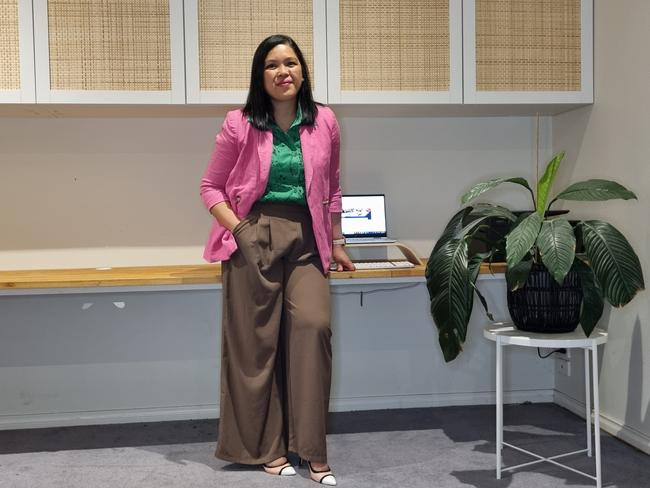Aussie workers more confident behind computers than in person, research shows
Experts say “we can all do better” when it comes to a particular workplace skill, without which, office “blow-ups” are more likely to occur.
Careers
Don't miss out on the headlines from Careers. Followed categories will be added to My News.
Many Aussie workers are no longer confident talking to colleagues face-to-face and are seeking to improve their interpersonal skills as they return to the office, new research shows.
Forty-four per cent of workers surveyed by HR leader HiBob and RMIT Online said developing better people skills had become their top priority, with the work-from-home trend leaving them more comfortable behind a computer screen than collaborating with others in person.
A lack of interpersonal skills can have devastating impacts, says communication specialist Leah Mether, citing alarming research that poor communication between hospital staff plays a significant role in preventable deaths.
In office settings, it can lead to “massive blow-ups” between co-workers, sometimes resulting in bullying claims, poor mental health, sackings and resignations, Mether says.
“I’ve heard so many horror stories. It can be really rough out there,” she says.
“I’ve seen projects totally derailed, I’ve seen many, many people go out on stress leave or resign.
“We all need improve (our interpersonal skills), we can all do better. I would argue the minute you think you know it all, you’re stuffed.”

Awkward office encounters
Since the end of the pandemic and a return to the workplace, Mether has seen an increase in workers and employers engaging in interpersonal skills training.
She says many feel “awkward” communicating face-to-face with colleagues after working remotely and have “forgotten how to disagree with respect, to debate ideas without attacking people and to work with people that they might not like”.
In an age where artificial intelligence is performing many of the technical components of jobs, Mether says interpersonal skills are more important than ever and will future proof careers. These include a range of non-job specific attributes such as communication, teamwork, emotional intelligence and leadership.
She says courses, books, blogs and podcasts can all provide advice to workers on how to strengthen interpersonal skills but on-the-job practise is vital to see any improvement.
Fostering connections IRL
HiBob vice president Damien Andreasen agrees people skills are essential, advising workers to “be present, be curious, ask questions and actively listen to the answers”.
“It’s never been more critical for Aussie professionals to develop interpersonal skills that foster connections IRL (in real life),” he says.
“Breakdowns in communication and a disjointed approach to teamwork have become all too common and with many employees more comfortable behind a screen, activities like collaborating effectively, presenting and mentoring people have become real challenges.”
He says all workers could benefit from improved interpersonal skills, which he believes is key to career progression.
“The best piece of career advice I give anyone who’s interested is to invest in relationships with your peers, colleagues and leadership,” he says.
“It’s the fastest way to climb the ladder.
“To do this, you will need to master interpersonal skills.”
Don’t overlook tech skills
Young workers in particular should look to improve their people skills, RMIT Online workforce solutions director Kade Brown says, given they likely started their career when Covid forced everyone to be socially distance and work from home.
But he believes technical capabilities still trump interpersonal skills when it comes to hiring decisions.
“For workers looking to accelerate their careers, I recommend investing in technical skills training and look to other mechanisms to grow your human or interpersonal skill set – including through shadowing others, seeking mentorship, seeking coaching and putting yourself in situations where you can learn by doing,” he says.

The art of conversation
As a self-confessed introvert and having started at a new company during Covid lockdowns, strategic workforce planner Jelvie Grech admits to some trepidation at returning to the office.
But the Melbourne-based worker says there’s been definite career benefits to stepping outside her comfort zone and face-to-face conversations with colleagues have given her a far better understanding of her organisation than she could have ever gained over Zoom.
“It absolutely takes a bit of courage (speaking to colleagues face-to-face). But I had no choice but to be comfortable with being uncomfortable,” says Grech, who now has a hybrid work arrangement, spending two days in the office and three days at home.
“Sometimes, it was just a case of (saying), ‘Hey, I’m really shy’ or ‘I’m not great at starting conversations’ and when you come from that vulnerable position … most people’s first response is to want to help.
“All of a sudden, a relationship (develops) and you find yourself chatting with these people regularly.”
Grech says it’s taken several years for in-person conversations with co-workers to feel “natural”. But she believes as long as she is genuine in her intentions, her colleagues will be understanding of any mistakes made along the way.
“I really want to build my connections and create relationships to do my job well,” she says.
“I constantly walk away and evaluate myself (after conversing with a co-worker, asking) ‘Could that conversation have come across better’.
“And if I didn’t really understand what they were talking about, I will make a mental note to look it up so when I meet them again, I can have that conversation a little better.”




